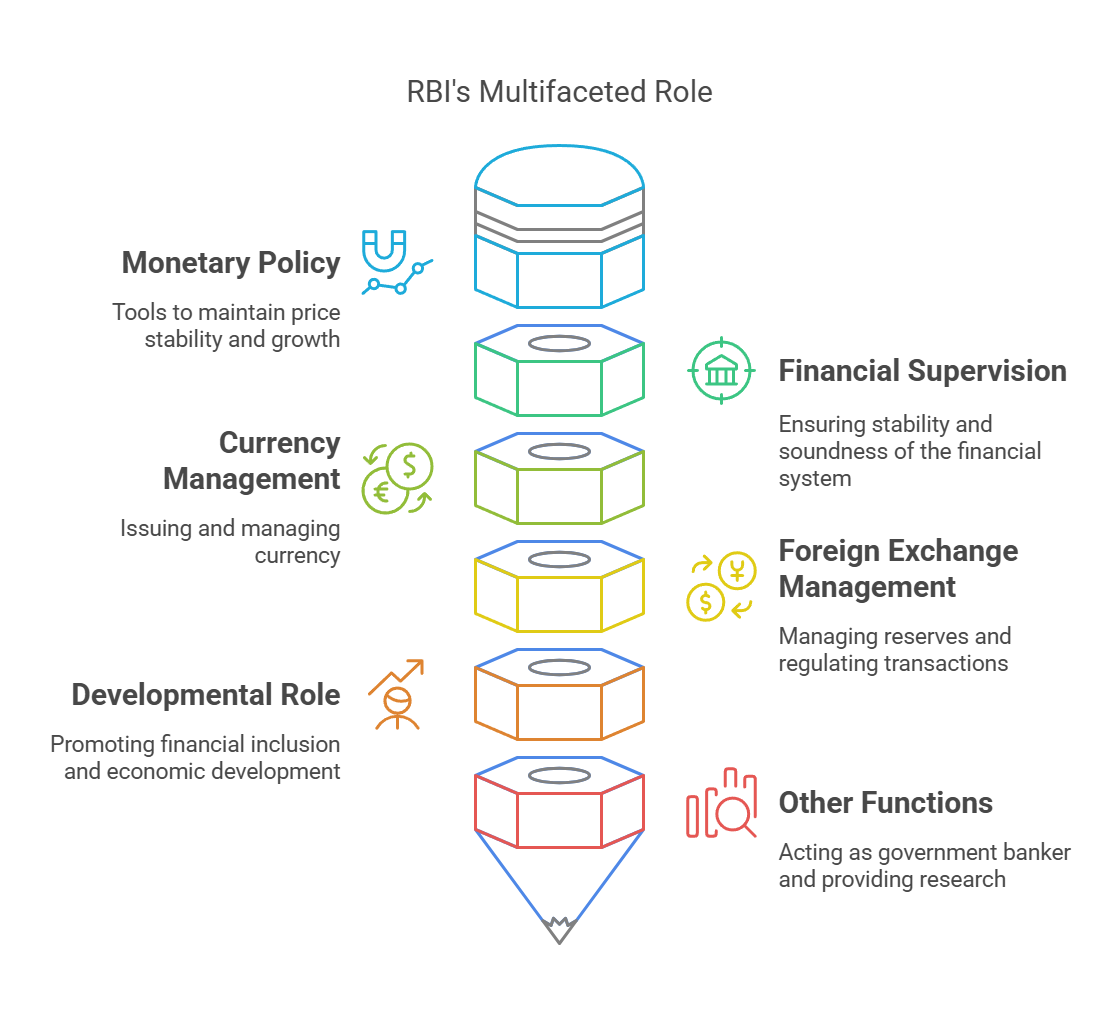RBI Functions
The Reserve Bank of India (RBI) is the central bank of India. Established in 1935, it plays a crucial role in the country's economic and financial stability. Here are its key functions:
1. Monetary Policy
- Objective: Maintain price stability while keeping in mind the objective of growth.
-
Tools:
- Repo Rate: The rate at which the RBI lends money to commercial banks.
- Reverse Repo Rate: The rate at which the RBI borrows money from commercial banks.
- Cash Reserve Ratio (CRR): The percentage of a bank's deposits that must be kept with the RBI.
- Statutory Liquidity Ratio (SLR): The percentage of a bank's deposits that must be invested in government securities.
- Open Market Operations (OMO): Buying and selling government securities in the open market to influence liquidity.
2. Financial Supervision and Regulation
- Objective: Ensure the stability and soundness of the financial system.
-
Functions:
- Banking Regulation: Licensing and regulating banks, setting prudential norms, and supervising their operations.
- Non-Banking Financial Companies (NBFCs) Regulation: Regulating and supervising NBFCs to ensure their financial health.
- Payment and Settlement Systems: Overseeing payment and settlement systems to ensure efficiency and security.
- Consumer Protection: Protecting the interests of bank customers and promoting financial literacy.
3. Currency Management
- Objective: Issue and manage currency, ensuring its availability and integrity.
-
Functions:
- Currency Issue: Issuing and distributing banknotes and coins.
- Currency Chest Management: Maintaining currency chests across the country for efficient distribution.
- Soiled Note Exchange: Exchanging soiled and mutilated notes for new ones.
- Counterfeit Currency Detection: Taking measures to prevent counterfeiting and detect fake currency.
4. Foreign Exchange Management
- Objective: Manage foreign exchange reserves and regulate foreign exchange transactions.
-
Functions:
- Maintaining Forex Reserves: Holding and managing India's foreign exchange reserves.
- Regulating Forex Transactions: Monitoring and regulating foreign exchange transactions to ensure stability.
- Intervention in Forex Market: Intervening in the foreign exchange market to manage exchange rate volatility.
5. Developmental Role
- Objective: Promote financial inclusion and support economic development.
-
Functions:
- Financial Inclusion: Promoting access to financial services for all segments of society.
- Priority Sector Lending: Mandating banks to lend a certain percentage of their loans to priority sectors like agriculture and small businesses.
- Rural Development: Supporting initiatives for rural development and agricultural finance.
6. Other Functions
- ** Banker to the Government:** Acting as the banker and financial advisor to the central and state governments.
- ** Lender of Last Resort:** Providing emergency liquidity support to banks facing financial difficulties.
- ** Debt Management:** Managing the government's public debt.
- ** Data Collection and Research:** Collecting and analyzing economic and financial data, conducting research, and publishing reports.
The RBI plays a multifaceted role in the Indian economy, contributing to its stability, growth, and development.
Key Functions of the Reserve Bank of India
Monetary Policy
Focuses on maintaining price stability and economic growth through various financial tools.
Financial Supervision
Ensures the stability of the financial system by regulating banks and financial entities.
Reserve Bank of India
Currency Management
Manages the issuance and integrity of currency in India.
Foreign Exchange
Regulates foreign exchange reserves and transactions to maintain stability.
Developmental Role
RBI's Multifaceted Role
Monetary Policy
Tools to maintain price stability and growth
Financial Supervision
Currency Management
Ensuring stability and soundness of the financial system
Issuing and managing currency
Foreign Exchange Management
Managing reserves and regulating transactions
Developmental Role
Promoting financial inclusion and economic development
Other Functions
Acting as government banker and providing researchR[](https://notes.collegehive.in/uploads/images/gallery/2025-01/image-1737740992935.png)
